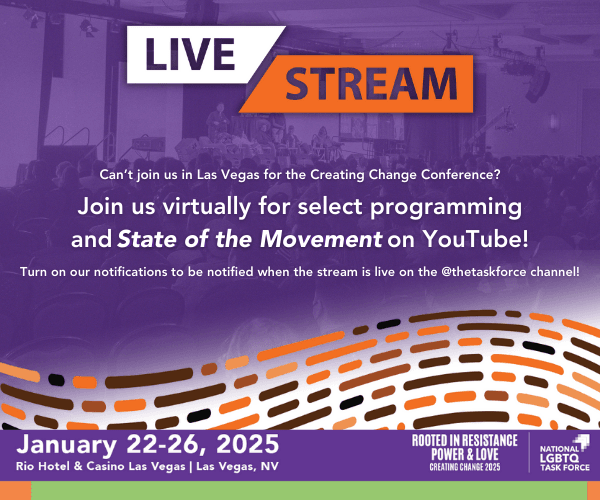CONTACTAbout UsCAREER OPPORTUNITIESADVERTISE WITH USPRIVACY POLICYPRIVACY PREFERENCESTERMS OF USELEGAL NOTICE
© 2025 Pride Publishing Inc.
All Rights reserved
All Rights reserved
By continuing to use our site, you agree to our Private Policy and Terms of Use.
U.S. groups fighting AIDS overseas are being given an ultimatum by the government: Pledge your opposition to sex trafficking and prostitution or do without federal funds. The new rule has created confusion among health groups that wonder how it will affect them and has drawn criticism from others who say it infringes on free speech rights and could do more harm than good.
It will affect about $2.2 billion in AIDS grants and contracts this year, according to Kent Hill, acting administrator for global health at the U.S. Agency for International Development, which recently issued a policy directive outlining the regulation.
Hill said the pledge is a tool the United States can use to make sure none of its money goes to support a practice he called degrading and debilitating. "Prostitution worldwide has always been connected to human rights violations, dehumanization, and organized crime," Hill said. "The vast majority of people, globally, do not find themselves there by choice."
Terri Bartlett, vice president for public policy at Population Action International, a health advocacy group for women's issues, said while she agrees with the idea behind the pledge, she thinks the government is infringing on health organizations' free speech rights by requiring it. "There's a litmus test of issues and organizations' positions on those issues, and regardless of their ability, they will be judged by that position," Bartlett said.
Bartlett said that while she agreed with the pledge requirement's premise that prostitution is a harmful occupation, she thought the pledge may have the unintended effect of deterring prostitutes from seeking help by unnecessarily singling them out. "We want to build trust and reduce stigma," Bartlett said of dealing with the high-risk population of prostitutes. "This policy flies in the face of what we know works."
There are groups that don't mind signing the pledge, however. "We agree with the statement," said Meredith Long, director of international health for World Relief.
Congress passed a bill containing the pledge requirement in 2003. It was immediately applied to foreign aid recipients, but the Justice Department questioned the constitutionality of applying it to domestic organizations. Last fall the department finally gave the all-clear for the government to implement the requirement here: The rule now affects private U.S. groups conducting AIDS programs overseas. If a group is looking for a federal grant or contract, it must first adopt a statement saying it opposes prostitution and sex trafficking. Then it must sign a form for the government promising it has the policy. Only then is the organization eligible for funding.
Michael Wiest, vice president of Catholic Relief Services, a recipient of USAID funds, said it would take a lot of time and money to make sure his organization wasn't working with any foreign partner groups that violated the pledge. He said that doing so would be wasted energy because "the idea that one of our partners would be pro-prostitution is off the charts."
Although the bill that contained the funding restrictions passed with broad bipartisan support, David Olson, a spokesman for Population Services International, said he is worried that the rules will be used against groups that use methods with which conservatives don't agree. "This administration has made no secret that they want new partners for AIDS work," Olson said. He said conservatives favor HIV prevention programs that focus on abstinence and monogamy, rather than ones that endorse condom use and safer sex.
U.S. senator Tom Coburn, an Oklahoma Republican, made statements to that effect in a letter he wrote to President Bush regarding AIDS programs last month. He specifically criticized USAID for funding Olson's group, which has programs aimed at educating prostitutes and their clients in nightclubs and at bingo-type games where the two groups traditionally mix. "There is something seriously askew at USAID when the agency's response to a dehumanizing and abusive practice that exploits women and young girls is parties and games," Coburn's letter said.
The anti-prostitution pledge rule is a continuation of conservative policy shifts the Bush administration has implemented for nongovernmental organizations. In 2001, on Bush's first day in office, he reinstated the "Mexico City policy," which prohibits private, foreign groups that receive federal family planning money from advising or even discussing the possibility of abortions for clients. The policy, called the "global gag rule" by critics, originated during President Reagan's era but was dropped during President Clinton's.
Besides the pledge, the new rules require AIDS groups to inform clients of condom failure rates. Another requirement is that the federal government must now give equal opportunity to funding applicants that have "a religious or moral objection" to a particular HIV prevention method or treatment program, such as condoms or needle exchanges. (AP)
From our Sponsors
Most Popular
31 Period Films of Lesbians and Bi Women in Love That Will Take You Back
December 09 2024 1:00 PM
18 of the most batsh*t things N.C. Republican governor candidate Mark Robinson has said
October 30 2024 11:06 AM
True
After 20 years, and after tonight, Obama will no longer be the Democrats' top star
August 20 2024 12:28 PM
Trump ally Laura Loomer goes after Lindsey Graham: ‘We all know you’re gay’
September 13 2024 2:28 PM
Melania Trump cashed six-figure check to speak to gay Republicans at Mar-a-Lago
August 16 2024 5:57 PM
Latest Stories
Why putting free period products in men's bathrooms is good for everyone
January 14 2025 3:03 PM
Apple, Costco stand behind DEI programs
January 14 2025 12:38 PM
New Jersey Democratic state Sen. Paul Sarlo calls trans women men and advocates for sports ban
January 14 2025 10:54 AM
Vatican welcomes straight-acting, celibate gay priests in training...for now
January 14 2025 10:50 AM
Michigan teen sentenced for 'execution-style' killing of Black trans woman Ashia Davis
January 14 2025 10:30 AM
Discover why Thailand is the ultimate LGBTQ+ paradise
January 14 2025 10:00 AM
Trending stories
Recommended Stories for You


















































































